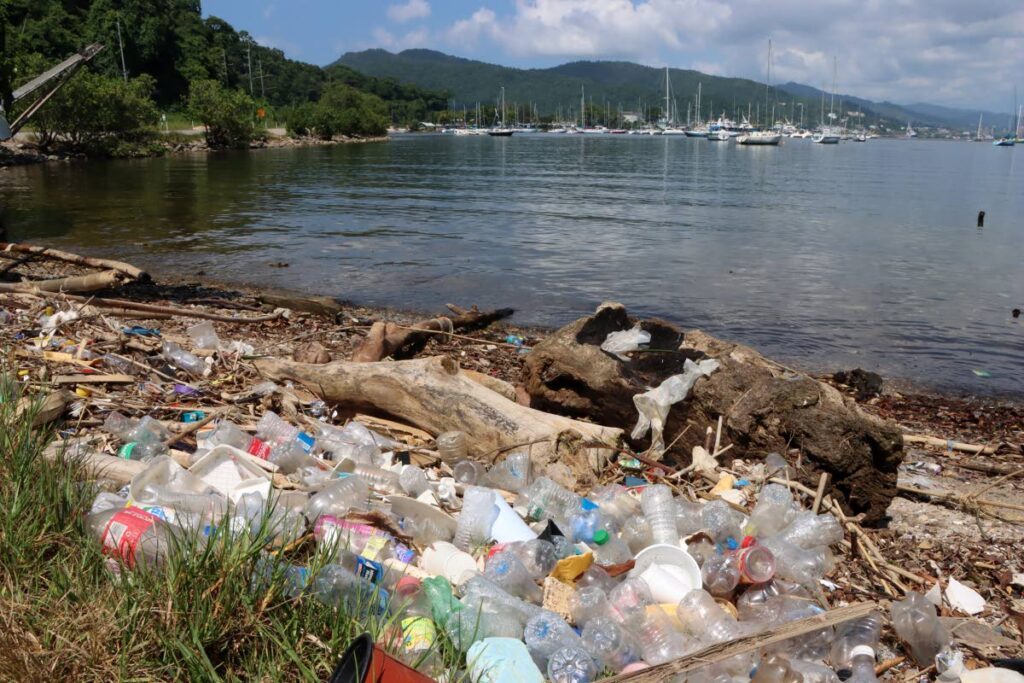The region's plastic challenge

The Caribbean, celebrated for its vibrant marine life and crystal-clear waters, stands at the forefront of an escalating environmental crisis.
The islands face a dire plastic challenge, with waste generation at 2.30 kg per person daily, significantly surpassing the global average of 1.55 kg.
The rapid increase in global plastic production, which escalated from 1.5 million tonnes in 1950 to a staggering 348 million tonnes by 2017, has placed the Caribbean in a precarious position, rendering it the second most plastic-contaminated sea after the Mediterranean.
A vast quantity of this plastic bypasses effective waste management systems, ending up in waterways and the sea, tarnishing the region's picturesque beauty.
A daunting tide
Recognising the urgency of the situation, 14 Caribbean countries have taken decisive action by implementing various bans on Styrofoam, plastic bags or other plastic products as of January 2019. According to the World Bank report titled, Marine Pollution in the Caribbean: Not a Minute to Waste, these bans represent a crucial step towards mitigating marine pollution, showcasing the Caribbean's commitment to the global fight against plastic waste. Despite these efforts, the challenge persists, highlighting the need for continued action and innovation in tackling plastic pollution. Haiti and Antigua and Barbuda, for example, banned Styrofoam and plastic bags in 2013 and 2016 respectively, as part of their initiatives to combat marine pollution.
Complexity of waste management
In Trinidad and Tobago, the struggle against plastic pollution is emblematic of the broader challenges faced by the Caribbean.
The proposed Beverage Container Bill, languishing since 1999, exemplifies the region's difficulties in implementing effective waste management policies.
In a 2019 paper, Plastics Waste Metabolism in a Petro-Island State: Towards Solving a Wicked Problem in Trinidad and Tobago, the sustainability challenges of this sector are described as an example of "wicked problems," characterised by its intricate complexity and the broad spectrum of stakeholders they impact.
To solve these problems, a comprehensive and collaborative approach involving the private sector, manufacturing industries, civil society and governments is needed to craft viable solutions.
A global perspective
The United Nations Environment Programme's 2023 report on plastic pollution, Turning off the tap, paints a grim picture, projecting a potential doubling or tripling of marine pollution by 2040. This alarming forecast underscores the critical need for interventions across the entire business model and value chain, emphasising the economic and environmental imperatives for sustainable practices. The global nature of plastic pollution requires a concerted effort, with interventions needed at every stage of the plastic lifecycle to mitigate its impact on the marine environment.
Role of companies: SPHERE framework
The introduction of the Sustainability in Packaging Holistic Evaluation for Decision-Making (SPHERE) framework developed the World Business Council for Sustainable Development (WBCSD) in 2023. This offers a beacon of hope, providing a structured methodology for companies to adopt sustainable packaging practices. By emphasising principles of safety, circularity, efficiency and responsible sourcing, SPHERE aims to guide companies through the complexities of sustainable packaging, highlighting the pivotal role businesses play in environmental stewardship. This framework represents a comprehensive guide for companies seeking to minimise their environmental footprint through sustainable packaging, from product design to end-of-life management.
Demonstrating commitment
The path forward requires more than policy changes. It demands tangible actions and measurable outcomes from companies significantly contributing to plastic waste.
The Caribbean's efforts to combat plastic pollution, while commendable, underscore the necessity for transparent reporting on progress, sector-wide efforts to reduce plastic footprints, and engagement in initiatives that support environmental sustainability.
Companies must move beyond claims of responsibility and demonstrate their commitment through auditable progress and transparent reporting.
A review of the published information by the largest bottled water and soft drinks producers in the Caribbean highlights how far these companies need to evolve in order to demonstrate responsible practices and good governance per national and international standards.
SDGs and impact standards
The United Nations' Sustainable Development Goals (SDGs), particularly SDG 12 and SDG 14, provide a global framework for addressing the scourge of plastic waste. Adherence to the SDG Impact Standards for Enterprises offers a path for companies to integrate sustainability into their strategy, management, transparency and governance, culminating in the SDG impact seal. This seal serves not merely as a badge of honour, but as a testament to a company's genuine commitment to sustainability. It distinguishes companies genuinely committed to sustainable practices from those engaged in greenwashing, marking a significant step in lobbying for industry-wide environmental reforms.
Transparency and accountability
The battle against plastic pollution in the Caribbean is an integral part of global efforts to safeguard marine ecosystems and promote sustainable business practices.
It is clear that in order to transform these wicked problems into value-preserving and sustainable value-adding solutions, we require partnerships across the industry, better regulation and enforcement, partnership with governments and a strong civil society sector that holds government and industry to account.
Stakeholders should hold each other to account to ensure that everyone does their part.
Caribbean companies can lead the way toward a cleaner, greener future by aligning with the SDG impact standards and embracing the SPHERE framework.
This collective endeavour calls for innovative solutions, steadfast commitment and the mobilisation of all stakeholders in the pursuit of sustainability, underscoring the interconnectedness of our global environmental challenge.
Dr Axel Kravatzky is managing partner of TT-based Syntegra-360 Ltd, vice-chair of ISO/TC309 Governance of Organizations and president of EUROCHAMTT.
He enables companies to flourish through integrated governance, certified management systems and transformational leadership.



Comments
"The region’s plastic challenge"